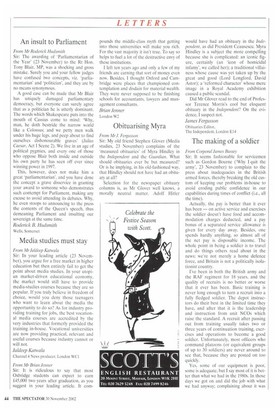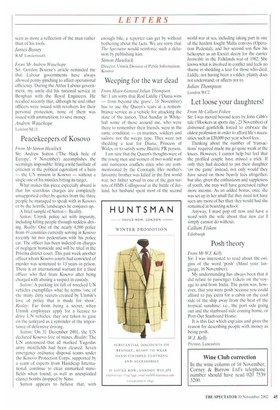The making of a soldier
From Corporal James Bussey Sir: It seems fashionable for servicemen such as Gordon Bourne ('Why I quit the army', 23 November) to complain to the press about inadequacies in the British armed forces, thereby breaking the old custom of keeping our problems in-house to avoid eroding public confidence in our capabilities during times of conflict (i.e., all the time).
Actually, the pay is better than it ever has been — on active service and exercises the soldier doesn't have food and accommodation charges deducted, and a pay bonus of a separated service allowance is given for every day away. Besides, one spends hardly anything, so almost all of the net pay is disposable income. The whole point in being a soldier is to travel and do things others read about in the news; we're not merely a home defence force, and Britain is not a politically isolationist country.
I've been in both the British army and the RAF regiment for 18 years, and the quality of recruits is no better or worse that it ever has been. Basic training is never long enough to turn a recruit into a fully fledged soldier. The depot instructors do their best in the limited time they have, and after that it is the leadership and instruction from unit NCOs which raise the standard. A recruit after passing out from training usually takes two or three years of continuation training, exercises and operations to become a good soldier. Unfortunately, most officers who command platoons (or equivalent groups of up to 30 soldiers) are never around to see that, because they are posted on too quickly.
Yes, some of our equipment is poor, some is adequate, but I say most of it is better than what we had in the 1980s. In those days we got on and did the job with what we had anyway; complaining about it was seen as more a reflection of the man rather than of his tools.
James Bussey
RAF Lossiemonth



























































































 Previous page
Previous page